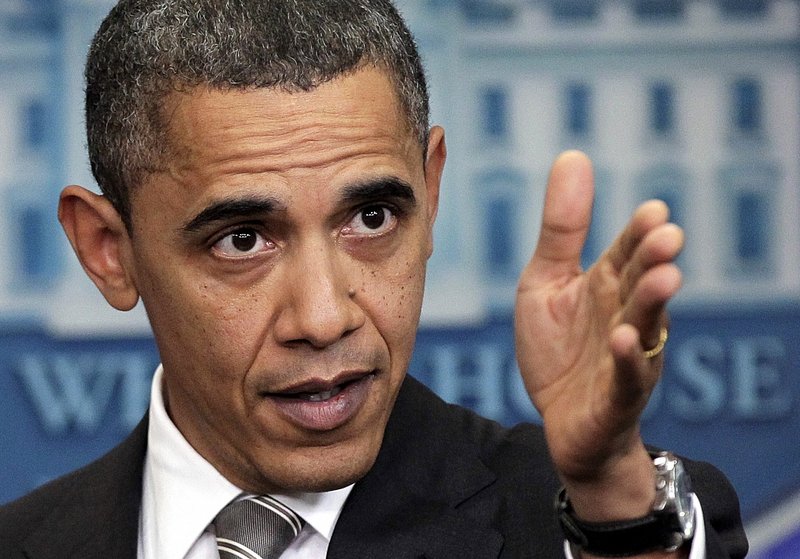WASHINGTON — Before President Obama’s news conference Tuesday, it was clear his willingness to compromise with Republicans on extending Bush-era tax cuts had left many liberal Democrats angry and dismayed. the time the president stepped away from the White House lectern 32 minutes later, it was equally clear the feeling was mutual.
Obama’s tone was alternately defensive and fiery. He dismissed his Democratic critics as “sanctimonious” and obsessed with staking out a “purist position.” He said they hold views so unrealistic that, by their measure of success, “we will never get anything done.”
“I don’t think there’s a single Democrat out there who, if they look at where we started when I came into office and look at where we are now, would say that somehow we have not moved in the direction that I promised,” he said.
“Take a tally,” the president challenged members of his party, seeming more riled by their criticism than by the opposition’s. “Look at what I promised during the campaign. There’s not a single thing that I’ve said that I would do that I have not either done or tried to do. And if I haven’t gotten it done yet, I’m still trying to do it.”
The remarks – along with the rebellion taking shape among liberals intent on letting the tax cuts for the wealthiest Americans expire – laid bare the fault line that for two years has separated Obama from some Democratic lawmakers and from the part of the party base that press secretary Robert Gibbs once dismissed as the “professional left.”
On Tuesday, Obama’s targets also included the GOP senators who insist that the tax cuts on household income above $250,000 remain in place permanently. As he described his inability to get those lawmakers to “budge,” and his unwillingness to allow the cuts to expire for all Americans on schedule at year’s end, Obama invoked an unusual analogy – one that is unlikely to help the bipartisan outreach efforts to which he committed himself after his party’s drubbing in the midterm elections.
“I’ve said before that I felt that the middle-class tax cuts were being held hostage to the high-end tax cuts,” he said. “I think it’s tempting not to negotiate with hostage-takers, unless the hostage gets harmed. Then people will question the wisdom of that strategy. In this case, the hostage was the American people, and I was not willing to see them get harmed.”
Acceding to the demands of hostage-takers is generally viewed as unwise because it risks encouraging future hostage-taking. Obama’s Democratic critics fear that is precisely the cue that Republican leaders will take from this standoff: threaten this president and win.
Obama himself is on the next ballot, in 2012, and his political challenge will be to win back independent voters who abandoned Democrats in the midterm elections and not alienate his party’s base in the process.
In a nod to the sentiments of his base, he said he would fight in two years to end the top-tier tax cuts when they would be set to expire under the deal. Referring to Republicans, he said tax cuts for the wealthy remain “their Holy Grail.”
He added, however, “a long political fight that carried over into next year might have been good politics, but it would have been a bad deal for the economy and it would be a bad deal for the American people.”
Obama criticized congressional Democrats for not holding a vote on the Bush tax cuts before the midterm elections, which he said would have served to “crystallize the positions of the two parties.” Polls show that most Americans favor allowing the top-tier tax cuts to expire.
And he complained that the fight over the tax cuts amounted to “the public option debate all over again,” a reference to the liberal criticism he received at the time over his inability to secure a government-run insurance option in his health care overhaul.
“So I pass a signature piece of legislation where we finally get health care for all Americans, something that Democrats had been fighting for a hundred years,” Obama began, “but because there was a provision in there that they didn’t get that would have affected maybe a couple of million people, even though we got health insurance for 30 million people and the potential for lower premiums for a hundred million people, that somehow that was a sign of weakness and compromise.”
The result of such an inflexible approach, he said, is that “people will have the satisfaction of having a purist position and no victories for the American people.”Many House Democrats emerged from a spirited closed-door caucus Tuesday evening and said they would have a difficult time supporting the tax package.
“I don’t think that the president should count on Democratic votes,” said Rep. Anthony Weiner, D-N.Y. “It’s a bad deal.”
Rep. Earl Pomeroy, D-N.D., said, “It seems to me this Congress should not be adding substantially to the deficit.”
House Democrats will lose their majority in January, but they still hold a 255-179 advantage in the current Congress that has a few more days of life.
Democratic staff members speculated that, for now, more than half of House Democrats seem inclined to oppose the compromise plan. Republican aides said many GOP members probably would back it.
– The Associated Press
Send questions/comments to the editors.



Success. Please wait for the page to reload. If the page does not reload within 5 seconds, please refresh the page.
Enter your email and password to access comments.
Hi, to comment on stories you must . This profile is in addition to your subscription and website login.
Already have a commenting profile? .
Invalid username/password.
Please check your email to confirm and complete your registration.
Only subscribers are eligible to post comments. Please subscribe or login first for digital access. Here’s why.
Use the form below to reset your password. When you've submitted your account email, we will send an email with a reset code.